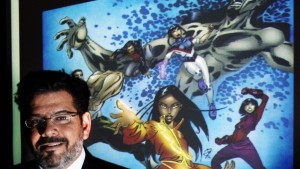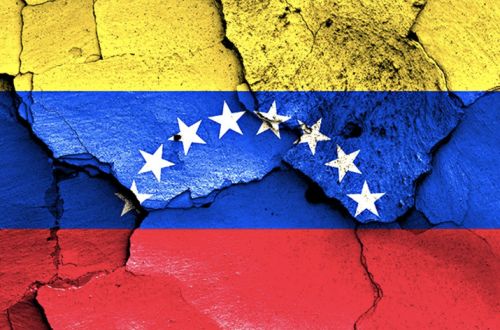Naif Al-Mutawa’s superhero creations, the 99, have proved popular over the world, and have been praised by President Obama. But hardliners, not for the first time, are accusing him of blasphemy:
While the Kuwaiti government has endorsed his work, not everyone agrees with its message. In the past year, a Twitter campaign has accused him of being a blasphemer who should be brought to trial; and a legal case has been launched against him – not by the state, but by a fellow Kuwaiti suing him for heresy. (If he loses – and he firmly believes he won’t – he could face a prison sentence.)
As the Independent points out, he also has detractors on the American conservative right. Having looked up what two of the usual suspects have to say about him, I couldn’t find any compelling evidence that he was actually some kind of stealth jihadist. Yes, one character (who is apparently French) wears a burkha, but many members of the 99 would probably get those puritanical Muslim Patrol types hot under the collar.
Al-Mutawa clearly set out, in part, to combat negative images of Islam and Muslims. He could have gone about this in different ways, made different choices. What kind of myth of origins accounts for the superheroes’ powers? It’s interesting that Al-Mutawa traces their story back to a moment which pitted a Muslim city against a non-Western enemy, and which foregrounded the importance of preserving learning and culture from those seeking to destroy books and artworks.
The first episode of The 99 begins in 1258, with the Siege of Baghdad. “Generation after generation of Arabs know this story. It is pivotal to our history, when the Mongols invaded and destroyed the Grand Library.”
And who would be the superheroes’ chief enemy? As with the myth of origins, here too the ‘clash of civilisations’ narrative has been avoided. The supervillain of the series is:
Rughal, an Osama bin Laden-inspired villain who could just as well be the face of Isis or “any other self-styled messiah” in our post-al-Qaeda world.
As the Independent reports, Al-Mutawa goes a step further than simply pitting more progressive Muslim heroes against a fundamentalist baddie. A key component of the 99 mythology is a “self-updating mechanism”. This might seem a slightly recondite plot element, but it reflects the creator’s strong views about the current divisions within Islam:
There is also what Al-Mutawa calls a “self-updating mechanism” within The 99. As he explains it: “Everyone believes the Koran is for all time and all place. Some people believe that means the original interpretation from ancient history is still relevant today – which I don’t believe. There there’s the group that thinks it is a living, breathing document. The ‘updating mechanism’ captures that. And Rughal does not want the updating to happen.”
Here’s some interesting further detail about how the mechanism plays out in the story:
The message here is that it is harmful for a minority to control the interpretation of Islam, but we do not explicitly state this. Also, all these stones have self updating mechanisms in them. Rughal does not want the stones to update past the 13th century which is when they were made so when he convinces ‘THE 99’ that he is the good guy, he gives all of them the same uniform. They look identical. He controls them by controlling the knowledge they have. On the other hand, Dr. Ramzi, the paternal guiding figure, reveals to them that each of their stones actually have a blue print for a uniform which is unique to them. The stones also update. Dr. Ramzi is a leader not a ruler. He is not threatened by ‘THE 99’ being stronger than him or smarter than him. They have competing leaderships: one is rigid, narrow and determined according to the whims of a single individual. The other is democratic, expansive and flexible.
The series has prompted mutterings of ‘Da’wah’, propaganda, apologism. But these accusations seem unearned, given how actively the series appears to articulate the necessity to combat fundamentalism, embracing instead an Islam which is hardwired to update itself automatically – a process which mustn’t be thwarted by regressive forces. Spiked reported back in 2011:
The Columbia-educated Dr Naif Al-Mutawa reportedly got the idea for The 99 after hearing about a Palestinian sticker book which championed suicide bombers. ‘I wanted to reposition Islam for Muslims’, he said in a recent interview.
With enemies on both sides, it’s probably just as well that 99 has been known to team up with the Justice League of America.
Gene adds: Here is a TED talk that al-Mutawa gave about The 99 in 2010. He seems like a decent guy who believes strongly in what he is doing but doesn’t take himself too seriously. I wish him and his project the best.



